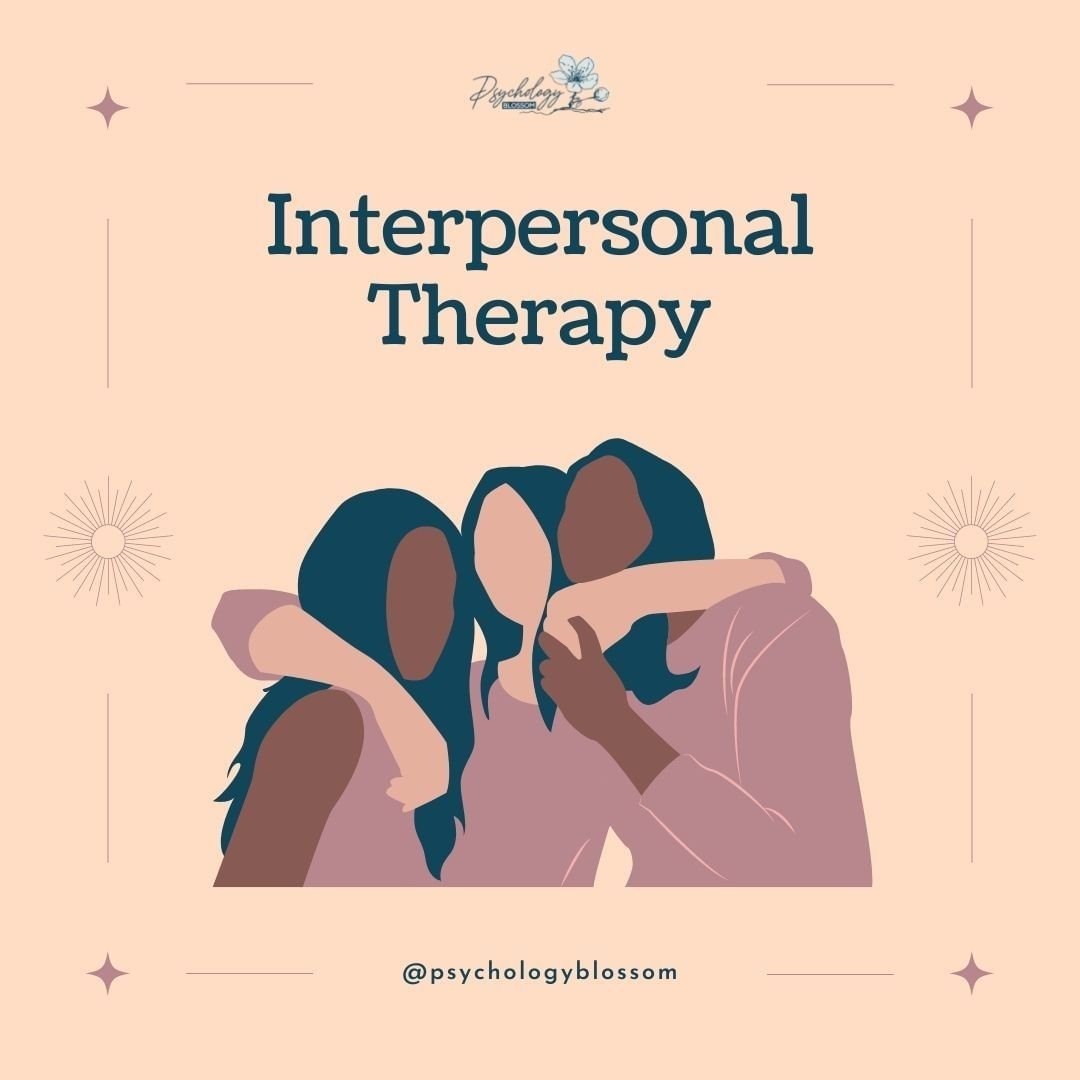Interpersonal relationships are important for your overall physical and emotional happiness. Relationships help fight loneliness while also giving you a sense of purpose in life. For instance, the closeness you feel with family and friends is an essential part of your social support. Relationships in other aspects of your life outside of romance and family can also have a positive effect on you, such as getting together with acquaintances for a shared interest or hobby. Thats what Interpersonal Therapy about
What is Interpersonal Psychotherapy (IPT)?
Interpersonal Therapy is a short-term form of psychotherapy, usually 12 to 16 sessions, that is used to treat depression and other conditions. As its name suggests, IPT focuses on your interpersonal relationships and social interactions—including how much support you have from others and the impact these relationships have on your mental health.
When Interpersonal Therapy was first developed, many mental health professionals conceptualized depression as “person-based.” That is, depression was not considered to be based on a person’s environment. IPT, on the other hand, recognizes that a person’s relationships can have a huge impact on mental health.
How Does It Work?
Interpersonal Therapy takes the approach of improving mental health by improving relationships, it begins with the therapist conducting an interpersonal inventory. This inventory is a detailed review of your significant relationships, both current and past. These relationships are then grouped according to four main problem areas.
✽ Grief
Depression can occur as a result of the loss of a loved one. While it is normal to go through the stages of grief in this type of situation, a major loss can also result in unresolved grief. This is grief that is delayed (remains for a long time after the loss), distorted, or grief in which you may not feel emotions, but instead experience other symptoms related to depression such as insomnia and fatigue.
✽ Role Dispute
Role disputes occur when you and the significant people in your life have different expectations about your relationship. An example of this is if you feel that your spouse should display more affection or ask more questions about your day. The disconnect between expectations and real-life behaviour can cause feelings of depression.
✽ Role Transition
Mental health issues may occur during life transitions, when your role changes and you don’t know how to cope with that change. Getting married, getting divorced, becoming a parent, and retiring are all examples of role transitions.
✽ Interpersonal Deficits
If you find it difficult to form and maintain good quality relationships, IPT can help identify your interpersonal deficits. This can include any feelings of inadequacy you may have, whether you find it difficult to express your emotions, and other feelings or beliefs that are preventing you from communicating effectively.
The Goals of Interpersonal Therapy
IPT aims to reduce current symptoms while strengthening your social supports and communication patterns so that improvements last. By clarifying expectations, practicing new skills, and increasing supportive contact, people often experience improved mood, more satisfying relationships, and a clearer sense of role and identity in the relationships that matter most.
What Happens in Sessions
Interpersonal Therapy is organised into three phases:
- Initial phase (Sessions 1–3): Your therapist completes the interpersonal inventory, maps current symptoms to problem areas, and collaborates with you on a focused treatment plan and goals (for example, “reduce conflict with partner about caregiving,” “rebuild routines and support after bereavement”).
- Middle phase (Sessions 4–12): You and your therapist work directly on the chosen problem area(s) using targeted strategies (for example, communication analysis, role-playing, and problem-solving). You try small between-session tasks to test new approaches and gather data from real life.
- Termination phase (Sessions 13–16): You consolidate gains, plan for setbacks, and identify ongoing supports. The final sessions review progress and outline a maintenance plan.
Core IPT Techniques (What We Practise Together)
- Communication analysis: Slowing down an important conversation—who said what, when, tone, assumptions—to find the exact moment a misunderstanding arose and to rehearse clearer wording for next time.
- Role negotiation: Clarifying and rebalancing expectations in a relationship (for example, how chores, childcare, finances, or emotional support are shared), and agreeing on concrete changes.
- Affect identification and expression: Naming the specific feelings underneath symptoms (sadness, anger, fear, guilt) and expressing them directly and respectfully to the relevant person.
- Decision analysis: Mapping options, consequences, and supports during a role transition (for example, moving jobs, becoming a parent, relocating), then choosing a time-limited experiment.
- Grief work: Telling the story of the loss, distinguishing grief from depression, staying connected to memories, and rebuilding routines and support.
- Social support activation: Identifying safe, helpful people and increasing frequency and quality of contact; learning how to ask for, receive, and reciprocate support.
Interpersonal Therapy for Common Life Situations
After a loss: Sessions focus on telling the story of the bereavement, identifying places grief is “stuck,” and re-engaging with meaningful roles and people without minimising what was lost.
In ongoing conflict: You practise expressing needs and boundaries without blame, learn de-escalation steps, and create a plan for repeated “flash points” (for example, money, in-laws).
During a role transition: You name what has changed (responsibilities, time, identity), grieve what no longer fits, and build routines and supports that fit the new chapter.
When relationships feel distant: You work on initiating, maintaining, and deepening connections—starting small (for example, one text or coffee per week) and building confidence through success.
How Interpersonal Therapy Differs From Other Therapies
Whereas Cognitive Behavioural Therapy (CBT) targets thoughts and behaviours directly, IPT focuses on the relational context in which symptoms occur—conversations, roles, and support. The emphasis is less on restructuring beliefs and more on changing how you interact and the expectations you hold with important people in your life. Many clients benefit from a blended approach (for example, CBT skills for sleep with Interpersonal Therapy work on conflict that keeps you up).
What You Can Expect Between Sessions
IPT often includes brief “real-world experiments” such as practicing a new boundary statement, scheduling a supportive activity, or initiating a check-in with a friend. These are not tests; they are opportunities to gather information about what helps and to tweak language and timing so changes fit your life.
Measuring Progress
We look for both symptom relief and relational change. Signs of progress include improved mood and energy, clearer communication, fewer or shorter conflicts, more regular contact with supportive people, and increased confidence in managing role transitions. You may notice you bounce back faster after setbacks and feel more aligned with your values in relationships.
Interpersonal Therapy Across the Lifespan
Adolescents: Focus on peer and family dynamics, school transitions, and identity changes. Sessions often include coaching for parents on supportive communication.
Perinatal period: For new or expecting parents, IPT addresses shifts in identity, sleep, support, and partnership dynamics, and it validates grief for the “old life” while building confidence in the new role.
Later life: Work may centre on bereavements, retirement, health changes, and renewing social roles that protect mood and meaning.
Cultural Sensitivity and Context
Relationships are shaped by culture, language, faith, and community. Interpersonal Therapy respects these contexts and adapts goals and strategies accordingly—for example, negotiating boundaries within multi-generational households, adjusting expectations across cultures, or considering norms for emotional expression and help-seeking in Singapore’s diverse communities.
When Interpersonal Therapy May Not Be the First Step
If safety is a concern (for example, active suicidality, severe substance dependence, or interpersonal violence), stabilisation and protective planning come first. Once safety is established, IPT can be integrated to rebuild support and repair or restructure relationship patterns where appropriate. The therapy is collaborative; you set the pace and retain choice at every step.
Practical Micro-Skills You Can Try This Week
- Feelings-first: Before a hard conversation, write the feeling you most want the other person to understand (for example, “I felt lonely last week”), then one specific request (“Could we have dinner together on Thursday?”).
- Repair phrase: “I care about you and I want us to understand each other. Can we take five minutes to restart this?” Use it to interrupt escalation.
- Support map: List three people who are safe and supportive in different ways (practical, emotional, fun). Choose one small contact to schedule this week.
- Transition journal: Name one loss, one gain, and one experiment for the week related to a life change you’re navigating.
What a Brief Interpersonal Therapy Exchange Might Sound Like
Therapist: “When you asked your partner about sharing night feeds, what did you say first?”
You: “I said, ‘You never help at night.’”
Therapist: “Let’s slow that down. If you lead with the feeling and a specific request, how might it sound?”
You: “‘I’m exhausted and getting irritable. Could you take the midnight feed on Tuesdays and Thursdays?’”
Therapist: “Clear and direct. How confident do you feel trying that this week?”
You: “A 7 out of 10.”
Therapist: “What would move it to an 8?”
You: “Texting first to choose the days.”
Therapist: “Great—let’s plan that text.”
Frequently Asked Questions
How long does Interpersonal Therapy take? Typically 12–16 weekly sessions, though the length can be adjusted based on goals and progress.
Does Interpersonal Therapy work if the other person won’t come to therapy? Yes. IPT focuses on your skills, boundaries, and supports. Your changes can shift patterns even when others don’t attend.
Will Interpersonal Therapy bring up painful feelings? Sometimes. Your therapist will help you pace work so it feels manageable, with grounding skills and clear consent at each step.
Can IPT be combined with medication? Yes. Many people benefit from combining Interpersonal Therapy with medication, especially for moderate to severe depression. Care is coordinated with your doctor when helpful.
Summary
Like all forms of psychotherapy, IPT can empower a person to change the way they think about and interact with others. The focus on relationships may be especially helpful for those grieving lost relationships or struggling to make their relationships work. For people with depression, Interpersonal Therapy is a highly effective treatment option that may be an alternative to medication.
Working with Us at Psychology Blossom
At Psychology Blossom, IPT is delivered with warmth, cultural sensitivity, and practical skill-building. We collaborate to define the problem area most tied to your current symptoms, practise clear and respectful communication, and activate supportive relationships. Our goal is for you to leave therapy with relief now and tools you can keep using long after sessions end.
If you’re curious about Interpersonal Psychotherapy for yourself or a loved one, we’re ready to help you take the next step toward steadier mood and stronger connections.
We recommend This Video to those who wants to learn more about Interpersonal Therapy.
About Us
We are a team comprising psychologists based in Singapore endeavouring our best to prioritise our clients’ needs. When you embark on this journey with us, we take a collaborative approach where you and your psychologist work closely together, and listen to what you have to say — No judgments, and in a safe space. Meet our Team
Quick Links
Contact Us
150 Cecil Street #07-02 S069543
Opening Hours
Monday to Friday: 8am to 6pm
Saturday: 8am to 2pm
Sunday: 10am to 2pm (Online only)
Admin Hours
Monday to Friday: 8am to 5.30pm
Saturday: 8am to 2pm
© Copyright 2023 – Psychology Blossom | Privacy Policy | Terms


